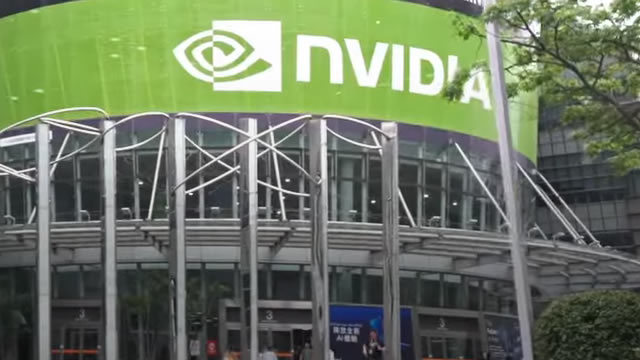Navigating the Volatility: A Closer Look at Nvidia’s Rebound Amidst Global Trade Tensions
The financial markets have been a rollercoaster ride in recent times, with investors and traders constantly digesting the potential fallout from the global trade war. As nations respond to President Trump’s tariff rollout, uncertainty looms large over the business world. Amidst this volatile climate, one stock that has begun to rebound is that of semiconductor giant, Nvidia (NVDA).
Understanding the Global Trade Tensions
The global trade tensions first emerged in early 2018 when the United States imposed tariffs on imported solar panels and washing machines. This was followed by the imposition of tariffs on steel and aluminum imports from several countries. In retaliation, countries like China, the European Union, and Canada imposed tariffs on various US exports, leading to a tit-for-tat trade war.
The Impact on Nvidia
Nvidia, a leading provider of graphics processing units (GPUs) for gaming, data centers, and automotive markets, initially felt the heat of the trade war. The company derives a significant portion of its revenue from exports, with China being a major market. The imposition of tariffs led to concerns about increased production costs and reduced demand, causing the stock to plummet.
Recent Developments
However, recent developments have given investors reason to be optimistic about Nvidia’s prospects. The company reported stronger-than-expected earnings in its most recent quarter, with revenue growing by 20% year-over-year. The demand for Nvidia’s GPUs in the data center segment, driven by the growing adoption of artificial intelligence and machine learning, has been particularly strong.
Impact on Individuals
- Investors: The ongoing trade tensions and the resulting market volatility can make it challenging for individual investors to make informed decisions. It is important to stay informed about the latest developments and to diversify your investment portfolio.
- Consumers: The trade war could lead to higher prices for certain goods, as companies pass on the increased production costs to consumers.
Impact on the World
- Economic Growth: The trade war could negatively impact global economic growth, as countries impose tariffs on each other’s exports.
- Innovation: The trade war could also stifle innovation, as companies may be less likely to invest in research and development due to the uncertainty.
Conclusion
The ongoing global trade tensions continue to create uncertainty in the financial markets. However, individual companies like Nvidia can still thrive amidst the volatility, as demonstrated by the company’s recent earnings report. As investors and consumers, it is important to stay informed about the latest developments and to be prepared for potential market fluctuations.
In the bigger picture, the trade war could have far-reaching consequences, affecting economic growth and innovation on a global scale. It is crucial for governments and businesses to work towards finding a resolution that benefits all parties involved.





